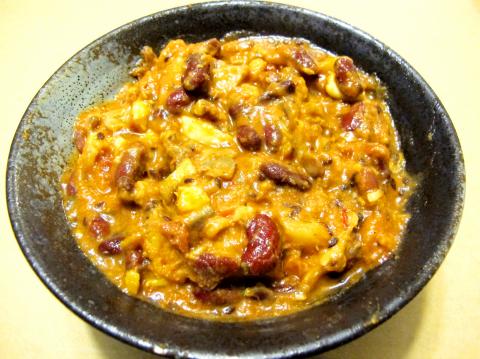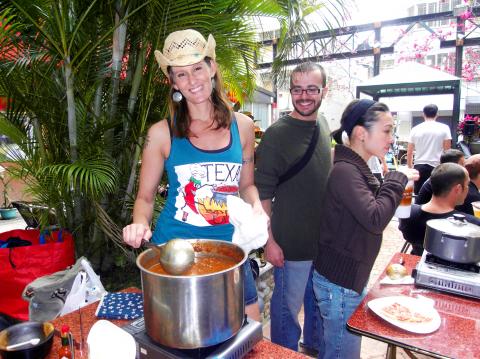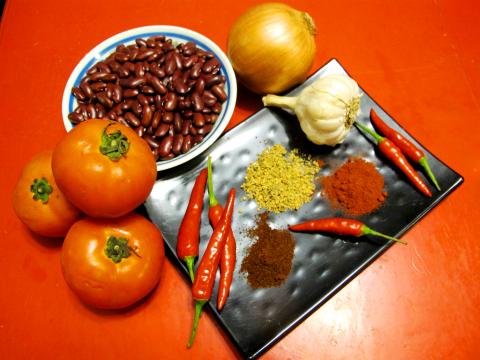One tale from Texas says that legendary gun-slinging outlaw Jesse James once refused to rob a bank because the town it was in had a restaurant that served his favorite chili. So it’s probably no surprise that there are chili cook-off competitions around the world.
Next weekend Chili Hunter takes place in Taichung, the 6th chili-making contest the city has hosted, featuring a hot line up of bands to raise money for the AmCham Kidz fund.
“Anyone who makes chili at home has some pride in their recipe,” said organizer Chris Ecker, owner of Soho 7 restaurant. “And let’s face it, if you like chili and you have the opportunity to gather in a place with enough chili to feed a rodeo ... you go. The competition is more of an excuse to eat many different chilies and maybe walk home with some bragging rights. The great thing about this year is we actually have some pretty good prizes for the best chilies.”

Photo courtesy of Alita Rickards and steve bateman
Prizes include a night at Hotel One in one of its swanky rooms (breakfast included), dinner for two at Hotel One cooked at the table by the head chef or a NT$2,000 voucher for dinner at Bystro Restaurant Grill.
When previous winner, Texan Alison Adair, saw an ad for the contest, she was “so pumped” she emailed the organizers immediately to sign up.
“I am a competitive person by nature and the thought of making chili, sharing it with others and the money going to charity, how could I possibly pass this up?” she said. Adair said her father would often make chili (considered the official state food for Texas) for Christmas dinner instead of the more traditional turkey.

Photo courtesy of Alita Rickards and steve bateman
Tootin’ good time
Having the event turn into a party is only natural, as “chili and beer go hand and hand,” Adair said. “It is like cookies and milk. Honestly I think people have chili competitions because it is an excuse to drink beer.”
Last year, “it was a damn shame it had to be cancelled due to the inconsistent government regulations in Taichung at the time,” said Ecker. “Around town, people were starting to talk about how much they missed it, so I approached a few friends that have organized other events in Taichung.”

Photo courtesy of Alita Rickards and steve bateman
Patrick Byrne, the party’s music director, said it used to be held at Soho Street in Taichung, but “due to all the bar closures and noise complaints the event was suspended,” prompting a new venue this year, Chungming Park (忠明公園).
The cowboys who popularized the dish were also known for their sing-a-longs after supper, and Chili Hunter has musical entertainment planned that would do them proud. The mostly Taichung-based line up includes Peaks, Megan Dooley and Rachel McPhail, Two Acres Plowed, and Aurora, as well as the Ever So Friendlies and one-man-band Mike Mudd.
Why is chili so special that people have contests about it? “For a question like that,” said Ecker, “I would usually respond with, ‘If you have to ask, then you’ve never had chili.’ Chili is one of those foods that people are always proud they’ve made. Everyone thinks their chili is the best.”
Most Taiwanese who have tried it have liked it, Ecker said.
Adair agrees. “I had a positive reaction from locals,” Adair said. “Probably because it wasn’t too spicy. Using quality meat definitely helps win people over.”
The Gas Thing
Her friend Audrey Yueh (岳小莞) said, “Until I tried the chili my friend [Adair] made, I always thought it was just a kind of sauce when you have Mexican food. It’s an unusual dish for Taiwan. It tasted like a thick beef soup.”
Joyce C. Payne (程玫維), originally from Taiwan but now living with her American husband in Pennsylvania said she likes it if it’s “good and spicy,” but doesn’t like the beans that much because of “the gas thing.”
She added that chili isn’t a great accompaniment to staple foods such as rice and noodles
Although she likes it, Huang Xiao-shan (黃小珊) from Taipei said she is also “not a big fan of the beans,” adding that it reminded her of instant noodles.
“It’s an easy comfort food,” Huang said.
“You never make a single serving,” like noodles, said Ecker, who also describes the spicy dish as a comfort food.
“You make a large pot and you eat it for days and days until it’s gone ... then you make some more,” he said.
For Ecker, the contest is a great way for people to show off their chili-making talents as well as hang out with friends, make new friends, and taste all the other chilies.
“It’s a social event,” he said.

June 9 to June 15 A photo of two men riding trendy high-wheel Penny-Farthing bicycles past a Qing Dynasty gate aptly captures the essence of Taipei in 1897 — a newly colonized city on the cusp of great change. The Japanese began making significant modifications to the cityscape in 1899, tearing down Qing-era structures, widening boulevards and installing Western-style infrastructure and buildings. The photographer, Minosuke Imamura, only spent a year in Taiwan as a cartographer for the governor-general’s office, but he left behind a treasure trove of 130 images showing life at the onset of Japanese rule, spanning July 1897 to

In an interview posted online by United Daily News (UDN) on May 26, current Chinese Nationalist Party (KMT) Chairman Eric Chu (朱立倫) was asked about Taichung Mayor Lu Shiow-yen (盧秀燕) replacing him as party chair. Though not yet officially running, by the customs of Taiwan politics, Lu has been signalling she is both running for party chair and to be the party’s 2028 presidential candidate. She told an international media outlet that she was considering a run. She also gave a speech in Keelung on national priorities and foreign affairs. For details, see the May 23 edition of this column,

The Taiwan People’s Party (TPP) on May 18 held a rally in Taichung to mark the anniversary of President William Lai’s (賴清德) inauguration on May 20. The title of the rally could be loosely translated to “May 18 recall fraudulent goods” (518退貨ㄌㄨㄚˋ!). Unlike in English, where the terms are the same, “recall” (退貨) in this context refers to product recalls due to damaged, defective or fraudulent merchandise, not the political recalls (罷免) currently dominating the headlines. I attended the rally to determine if the impression was correct that the TPP under party Chairman Huang Kuo-Chang (黃國昌) had little of a

At Computex 2025, Nvidia CEO Jensen Huang (黃仁勳) urged the government to subsidize AI. “All schools in Taiwan must integrate AI into their curricula,” he declared. A few months earlier, he said, “If I were a student today, I’d immediately start using tools like ChatGPT, Gemini Pro and Grok to learn, write and accelerate my thinking.” Huang sees the AI-bullet train leaving the station. And as one of its drivers, he’s worried about youth not getting on board — bad for their careers, and bad for his workforce. As a semiconductor supply-chain powerhouse and AI hub wannabe, Taiwan is seeing